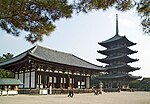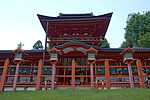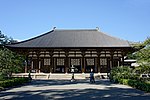Historic Monuments of Ancient Nara
Historic Monuments of Ancient Nara is the UNESCO World Heritage Site in Nara in Nara Prefecture, Japan.[1]
| UNESCO World Heritage Site | |
|---|---|
| Location | Nara Prefecture, Kansai region, Japan |
| Criteria | Cultural: (ii), (iii), (iv), (vi) |
| Reference | 870 |
| Inscription | 1998 (22nd Session) |
| Area | 617 ha (1,520 acres) |
| Buffer zone | 1,962.5 ha (4,849 acres) |
| Coordinates | 34°40′32″N 135°50′22″E / 34.67556°N 135.83944°E |
The site covers eight places in the old capital city of Nara. Five are Buddhist temples, one is a Shinto shrine, one is a Palace and one a primeval forest.
History
Nara was the capital of Japan from 710 to 784. The city's historic structures show what life was like in the Japanese capital in the 8th century.[1]
All of the shrine and temple compounds have been recognized as "Historic Sites". The Nara Palace has been named as a "Special Historic Site". The Kasugayama forest is a Special "Natural Monument".[2]
The several properties include 26 buildings which have been named by the Japanese Government as "National Treasures". Also, there are 53 buildings which have been named as "Important Cultural Properties". [2]
In 1998, UNESCO listed parts of Nara as a World Heritage Site.[1]
Table
| Name | Image | Location | Notes |
|---|---|---|---|
| Tōdai-ji (東大寺, Tōdai-ji, Eastern Great Temple)[1] |  | Nara | cultural site |
| Kōfuku-ji (興福寺, Kōfuku-ji)[1] |  | Nara | cultural site |
| Kasuga Shrine (春日大社, Kasuga-taisha)[1] |  | Nara | cultural site |
| Gangō-ji (元興寺)[1] |  | Nara | cultural site |
| Yakushi-ji (薬師寺)[1] |  | Nara | cultural site |
| Tōshōdai-ji (唐招提寺)[1] |  | Nara | cultural site |
| Heijō Palace (平城宮, Heijō-kyū)[1] |  | Nara | cultural site |
| Kasugayama Primeval Forest (春日山原始林, Kasugayamagenshirin)[1] |  | Nara | natural site |
Related pages
References
Other websites
 Media related to Nara, Nara at Wikimedia Commons
Media related to Nara, Nara at Wikimedia Commons
